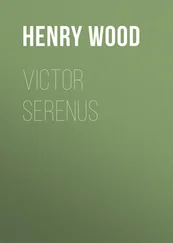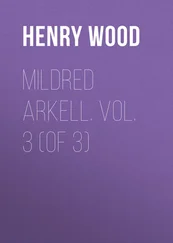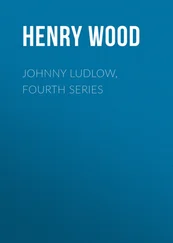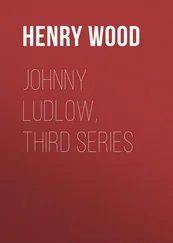Henry Wood - Johnny Ludlow, Sixth Series
Здесь есть возможность читать онлайн «Henry Wood - Johnny Ludlow, Sixth Series» — ознакомительный отрывок электронной книги совершенно бесплатно, а после прочтения отрывка купить полную версию. В некоторых случаях можно слушать аудио, скачать через торрент в формате fb2 и присутствует краткое содержание. Жанр: foreign_prose, literature_19, foreign_antique, на английском языке. Описание произведения, (предисловие) а так же отзывы посетителей доступны на портале библиотеки ЛибКат.
- Название:Johnny Ludlow, Sixth Series
- Автор:
- Жанр:
- Год:неизвестен
- ISBN:нет данных
- Рейтинг книги:5 / 5. Голосов: 1
-
Избранное:Добавить в избранное
- Отзывы:
-
Ваша оценка:
- 100
- 1
- 2
- 3
- 4
- 5
Johnny Ludlow, Sixth Series: краткое содержание, описание и аннотация
Предлагаем к чтению аннотацию, описание, краткое содержание или предисловие (зависит от того, что написал сам автор книги «Johnny Ludlow, Sixth Series»). Если вы не нашли необходимую информацию о книге — напишите в комментариях, мы постараемся отыскать её.
Johnny Ludlow, Sixth Series — читать онлайн ознакомительный отрывок
Ниже представлен текст книги, разбитый по страницам. Система сохранения места последней прочитанной страницы, позволяет с удобством читать онлайн бесплатно книгу «Johnny Ludlow, Sixth Series», без необходимости каждый раз заново искать на чём Вы остановились. Поставьте закладку, и сможете в любой момент перейти на страницу, на которой закончили чтение.
Интервал:
Закладка:
Matilda’s hands lifted themselves with a convulsive movement and fell again. Her eyes flashed fire.
“ Your wife? ”
“If you have no objection,” he replied. “My dear old mother goes into Wales next month, and Fanny comes here in her place.”
With a cry, faint and mournful as that of a wounded dove, Matilda put her hands before her face and leaned back in her chair. If she had in truth loved Thomas Owen, if she loved him still, the announcement must have caused her cruel pain.
He resumed his narrative; assuming as facts what he had in his own mind conceived to have been the case, and by implication, but not directly, charging Matilda with the crime. It had a dreadful effect upon her; her agitation increased with every word. Suddenly she rose up in the chair, her arms lifted, her face distorted. One of those fits of passion had come on.
We had a dreadful scene. Owen was powerful, I of not much good, but we could not hold her. Fanny ran sobbing into her own door and sent in two of the shopmen.
It was the climax in Matilda Valentine’s life. One that perhaps might have been always looked for. From that hour she was an insane woman, her ravings interspersed with lucid intervals. During one of these, she disclosed the truth.
She had loved Thomas Owen with a passionate love. Mistaking the gossip and the nonsense that the young man was fond of chattering to her and Jane Cross, she believed her love was returned. On the day preceding the tragedy, when talking with him after morning service, she had taxed him with paying more attention to Jane Cross than to herself. Not a bit of it, he had lightly answered; he would take her for a walk by the seashore that evening if she liked to go. But, whether he had meant it, or not, he never came, though Matilda dressed herself in readiness. On the contrary, he went to church, met Jane there, and walked the best part of the way home with her. Matilda jealously resented this; her mind was in a chaos; she began to suspect that it was Jane Cross he liked, not herself. She said a word or two upon the subject to Jane Cross the next day, Monday; but Jane made sport of it—laughed it off. So the time went on to evening, when they were upstairs together, Jane sewing, Matilda writing. Suddenly Jane Cross said that Thomas Owen was coming along, and Matilda ran to the window. They spoke to him as he passed, and he said he would look in as he returned from Munpler. After Matilda’s letter to her brother was finished, she began a note to Thomas Owen, intending to reproach him with not keeping his promise to her and for joining Jane Cross instead. It was the first time she had ever attempted to write to him; and she stuck her work-box with the lid open behind the sheet of paper that Jane Cross might not see what she was doing. When it grew dusk, Jane Cross remarked that it was blind man’s holiday and she would go on down and lay the supper. In crossing the room, work-basket in hand, she passed behind Matilda, glanced at her letter, and saw the first words of it, “Dearest Thomas Owen.” In sport, she snatched it up, read the rest where her own name was mentioned, and laughingly began, probably out of pure fun, to teaze Matilda. “Thomas Owen your sweetheart!” she cried, running out on to the landing. “Why, he is mine. He cares more for my little finger than for–” Poor girl! She never finished her sentence. Matilda, fallen into one of those desperate fits of passion, had caught her up and was clutching her like a tiger-cat, tearing her hair, tearing pieces out of her gown. The scuffle was brief: almost in an instant Jane Cross was falling headlong down the well of the staircase, pushed over the very low balustrades by Matilda, who threw the work-basket after her.
The catastrophe sobered her passion. For a while she lay on the landing in a sort of faint, all strength and power taken out of her as usual by the frenzy. Then she went down to look after Jane Cross.
Jane was dead. Matilda, not unacquainted with the aspect of death, saw that at once, and her senses pretty nearly deserted her again with remorse and horror. She had never thought or wished to kill Jane Cross, hardly to harm her, she liked her too well: but in those moments of frenzy she had not the slightest control over her actions. Her first act was to run and lock the side door in the garden wall, lest anyone should come in. How she lived through the next half-hour, she never knew. Her superstitious fear of seeing the dead Edmund Peahern in the house was strong—and now there was another! But, with all her anguish and her fear, the instinct of self-preservation was making itself heard. What must she do? How could she throw the suspicion off herself? She could not run out of the house and say, “Jane Cross has fallen accidentally over the stairs; come and look to her”—for no one would have believed it to be an accident. And there were the pieces, too, she had clutched out of the gown! Whilst thus deliberating the gate-bell rang, putting her into a state of the most intense terror. It rang again. Trembling, panting, Matilda stood cowering in the kitchen, but it did not ring a third time. This was, of course, Thomas Owen.
Necessity is the mother of invention. Something she must do, and her brain hastily concocted the plan she should adopt. Putting the cloth and the bread and cheese on the table, she took the jug and went out at the front door to fetch the usual pint of ale. A moment or two she stood at the front door, peering up and down the road to make sure that no one was passing. Then she slipped out, locking the door softly; and, carrying the key concealed in the hollow of her hand, she threw it amidst the shrubs at No 1. Now she could not get into the house herself; she would not have entered it alone for the world: people must break it open. All along the way to the post-office, to which she really did go, and then to the Swan, she was mentally rehearsing her tale. And it succeeded in deceiving us all, as the reader knows. With regard to the visit of her brother on the Wednesday, she had told Thomas Owen the strict truth; though, when he first alluded to it in the churchyard, her feelings were wrought up to such a pitch that she could only cry out and escape. But how poor Matilda contrived to live on and carry out her invented story, how she bore the inward distress and repentance that lay upon her, we shall never know. A distress, remorse, repentance that never quitted her, night or day; and which no doubt contributed to gradually unhinge her mind, and throw it finally off its balance.
Such was the true history of the affair at No. 7, which had been so great a mystery to Saltwater. The truth was never made public, save to the very few who were specially interested in it. Matilda Valentine is in an asylum, and likely to remain there for life; whilst Thomas Owen and his wife flourish in sunshine, happy as a summer day is long.
CARAMEL COTTAGE
I.—EDGAR RESTE
I
It was early in August, and we were at Dyke Manor, for the Squire had let us go home from school for the Worcester races. We had joined him at Worcester the previous day, Tuesday, driving home with him in the evening. To-morrow, Thursday, he would drive us over to the course again; to-day, Wednesday, the horses would have rest; and on Friday we must return to school.
Breakfast was over, the Squire gone out, and the few minutes’ Bible-reading to us—which Mrs. Todhetley never forgot, though Tod did not always stay in for it, but he did this morning—came to an end. Hannah appeared at the door as she closed the Book.
“Miss Barbary’s come, ma’am,” she said.
“Run, my dear,” cried Mrs. Todhetley to Lena.
“I don’t want to,” said Lena, running to the open window instead, and nearly pitching head-foremost through it: upon which Hannah captured her and carried her off.
Читать дальшеИнтервал:
Закладка:
Похожие книги на «Johnny Ludlow, Sixth Series»
Представляем Вашему вниманию похожие книги на «Johnny Ludlow, Sixth Series» списком для выбора. Мы отобрали схожую по названию и смыслу литературу в надежде предоставить читателям больше вариантов отыскать новые, интересные, ещё непрочитанные произведения.
Обсуждение, отзывы о книге «Johnny Ludlow, Sixth Series» и просто собственные мнения читателей. Оставьте ваши комментарии, напишите, что Вы думаете о произведении, его смысле или главных героях. Укажите что конкретно понравилось, а что нет, и почему Вы так считаете.












